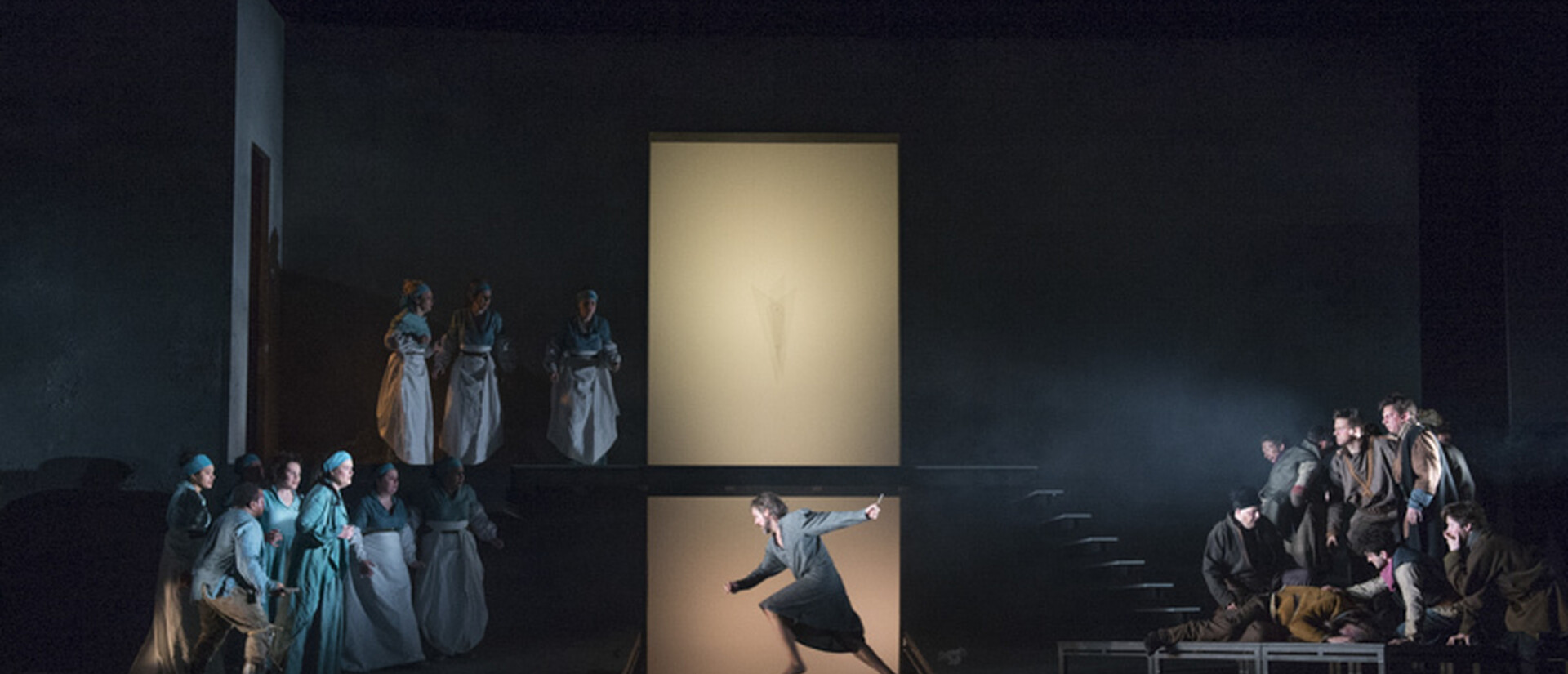
Musically it’s terrific.
The Guardian
And if you want to hear world-class singing, that’s what you’ll get from soprano Catherine Carby in the title role.
The Independant
Serious opera lovers shouldn’t miss it.
The Telegraph
Synopsis
Background
On their way to attack Troy, the Greek forces assembled at Aulis; there they waited vainly for wind to fill their sails. The goddess Diana protected Troy, and only consented to revive the wind on the condition that the commander Agamemnonsacrifice his 12 year old daughter, Iphigenia. To this condition he agreed – although, unknown to the Greeks, Diana spirited away the girl at the moment of sacrifice, and placed her in her own temple in the land of Taurus (Crimea).
On his return from Troy to Mycenae, the victorious Agamemnon is murdered by his wife (Clytemnestra) and her lover. In revenge Agamemnon’s son Orestes murders his mother. Pursued by the Furies, he is instructed to steal the image of Diana in her temple at Taurus, and to restore it to the Greeks.
All of the action takes place in the temple of Diana at Taurus, fifteen years after the apparent sacrifice of Iphigenia at Aulis.
Act I
A terrible storm rages.
Iphigenia tells her companions (Greek captives like her, priestesses of the temple) of a dream she has had. In the dream her home was destroyed, her father killed by her mother, and a blade was passed to her; although her brother Orestes cried for help, she was forced to kill him. During her long captivity in Taurus, Iphigenia has hoped to be reunited with her brother; now she only longs for death.
The Scythian leader, Thoas, is filled with foreboding. His followers arrive with two strangers who were found on the shore; they will be sacrificed to the goddess, like all strangers, to expiate the terrible blood-guilt that oppresses the Scythians. The priestesses are overwhelmed by dread, and the Scythians dance.
Act II
The two new captives are Orestes and Pylades, cousins and lovers. Orestes’ mental health has been perilous since killing his mother and her lover; he now fears that he has brought his friend to certain death. Pylades tries to console him, explaining that dying together should not be a hardship.
A Scythian temple guard separates them. Alone, Orestes senses the Furies closing in on him. He sleeps, and wakes to a vision of Clytemnestra, his mother – but it is Iphigenia. Questioned by her about the fate of Mycenae, he describes the murders of Agamemnon and Clytemnestra – and suggests that Orestes, too, is dead.
Overwhelmed by grief, Iphigenie leads the priestesses in funerary rites for Orestes; they now have no homeland, and she no family.
Act III
Iphigenia has readily agreed with the priestesses to free one of the captives. Something draws her to the morbid, brooding captive (Orestes), so when each of the men refuses to leave the other she herself makes the choice. Orestes is distraught that he should live and his friend die; he says that he will kill himself, rather than flee to Greece with a message from Iphigenia. She cedes. Pylades it is who must go.
Act IV
Iphigenia cannot bring herself to sacrifice this stranger. The others have prepared him, and he seems to desire death, but still she cannot strike. At the moment when she is about to kill him, the stranger calls out a blessing on the sister whose sacrifice started this round of revenge: Iphigenia. Iphigenia then recognises her brother, Orestes.
Thoas has heard that one of the captives was freed: furious, he demands that the other be butchered immediately. He does not care that he is requiring a sister to kill her brother.
Pylade returns, and menaces Thoas. The Greeks are about to be slaughtered by the Scythians when the goddess herself intervenes; the Greeks are to return home unmolested, carrying with them her own image. It seems that the sore trials imposed by the gods on the Greeks have abated.
Artists
![]()
Catherine Carby
Iphigénie![]()
Grant Doyle
Oreste![John Colyn Gyeantey image]()
John Gyeantey
Pylade![Craig Smith image]()
Craig Smith
Thoas![Susanna Fairbairn image]()
Susanna Fairbairn
Priestess![]()
Samantha Hay
Priestess![]()
Bradley Travis
Scythian Guard![Ashley Mercer image]()
Ashley Mercer
Minister of the Sanctuary![]()
Luci Briginshaw
Chorus![Alison Manifold image]()
Alison Manifold
Chorus![Vanessa Bowers image]()
Vanessa Bowers
Chorus![Felicity Buckland image]()
Felicity Buckland
Chorus![Helen Johnson image]()
Helen Johnson
Chorus![]()
Amy J Payne
Chorus![Coburn Aidan image]()
Aidan Coburn
Chorus![Simon Gfeller image]()
Simon Gfeller
Chorus![Alex Vearey Roberts image]()
Alex Vearey Roberts
Chorus![David de Winter image]()
David de Winter
Chorus![Chris Jacklin image]()
Chris Jacklin
Chorus![Jan Capinski image]()
Jan Capinski
Chorus![Maciek O'Shea image]()
Maciek O'Shea
Chorus![Lukasz Karauda image]()
Lukasz Karauda
Chorus![Jamie Rock image]()
Jamie Rock
Chorus




























